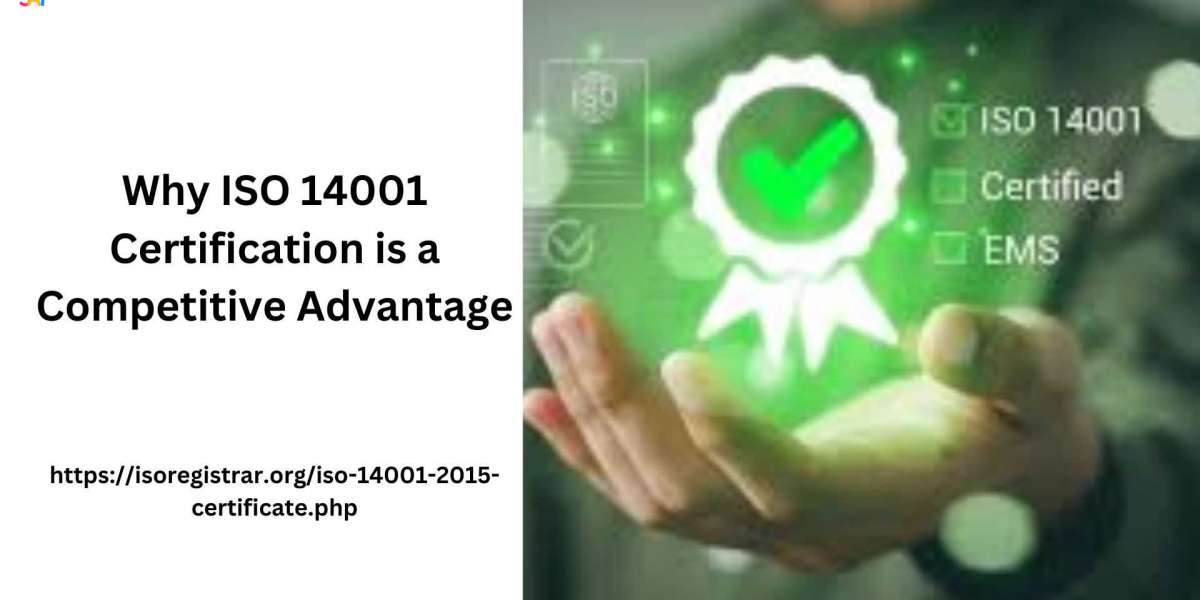In today’s increasingly environmentally conscious world, businesses are under constant pressure to demonstrate their commitment to sustainability and environmental responsibility. One effective way to do this is by obtaining ISO 14001 certification, an internationally recognized standard for environmental management systems (EMS). While the environmental benefits of ISO 14001 are well-known, its impact on a company's competitiveness is often underestimated. This certification can provide significant competitive advantages across various industries. Here's why ISO 14001 certification is more than just an environmental credential—it's a strategic asset for businesses.
1. Improved Brand Image and Reputation
In a marketplace where consumers, investors, and partners are becoming more environmentally conscious, ISO 14001 certification serves as proof of a company’s commitment to sustainable practices. Achieving certification demonstrates that the organization is actively managing its environmental impact, which can be a key differentiator in the eyes of customers and stakeholders. Many consumers prefer to buy from companies that have environmentally responsible practices, and they are more likely to remain loyal to brands that promote sustainability.
Incorporating ISO 14001 into a company’s sustainability efforts enhances its reputation, portraying the organization as responsible and proactive in addressing environmental challenges.
2. Cost Savings and Efficiency
One of the significant benefits of implementing an Environmental Management System (EMS) under ISO 14001 is the ability to reduce operational costs. ISO 14001 focuses on minimizing waste, reducing energy consumption, and improving the overall efficiency of processes. Businesses are encouraged to identify areas where resources can be used more effectively, leading to cost reductions.
For example, a company may find that reducing waste disposal costs, cutting energy usage, or using materials more efficiently can significantly lower operational expenses. Over time, these cost savings can be substantial, improving the company’s bottom line and allowing it to reinvest in innovation or growth opportunities.
3. Compliance with Legal and Regulatory Requirements
Environmental regulations are becoming increasingly stringent worldwide, and businesses that fail to comply with these regulations can face fines, legal consequences, or damage to their reputation. ISO 14001 helps organizations stay ahead of changing environmental laws by providing a framework for ongoing compliance. By regularly monitoring and evaluating environmental practices, companies can proactively address potential issues and avoid non-compliance.
For companies operating internationally, ISO 14001 certification can be particularly beneficial, as it ensures they meet global environmental standards and regulations. This helps prevent costly penalties and enables businesses to operate seamlessly in multiple regions with varying environmental regulations, thereby enhancing their competitiveness in global markets.
4. Enhanced Market Access and Opportunities
ISO 14001 certification is often a requirement for tendering or bidding on contracts, particularly in industries such as construction, manufacturing, and supply chain management. Many large companies and government bodies require their suppliers to demonstrate compliance with environmental standards, making ISO 14001 certification a key factor in securing contracts and business opportunities.
In sectors where sustainability is a critical factor, ISO 14001 certification can give businesses a competitive edge over rivals that do not meet the same environmental criteria. Furthermore, the certification can open doors to new markets, especially in countries where environmental standards are strictly enforced.
5. Increased Employee Engagement and Morale
ISO 14001 certification involves employees at all levels of the organization. The process of implementing an EMS requires training, awareness, and participation from the workforce. This involvement can lead to increased employee engagement, as employees feel proud to work for a company that is committed to sustainability and environmental stewardship.
Moreover, fostering a culture of environmental responsibility can improve morale and job satisfaction, as employees increasingly value working for organizations that share their values. A motivated and engaged workforce is often more productive and loyal, which can translate into better performance and reduced turnover—both of which contribute to a more competitive business.
6. Continuous Improvement and Innovation
ISO 14001 encourages businesses to adopt a continuous improvement mindset. The standard requires organizations to set environmental objectives, measure their performance, and take corrective actions when needed. This cycle of monitoring, evaluating, and improving helps companies adapt to new environmental challenges, innovate their processes, and stay ahead of competitors.
In addition to improving environmental performance, the continuous improvement process often leads to greater overall business efficiency and effectiveness. Companies with ISO 14001 certification are well-positioned to innovate in areas such as product design, waste management, and energy use, keeping them competitive in an ever-evolving marketplace.
7. Strengthened Stakeholder Relationships
ISO 14001 certification fosters better relationships with stakeholders, including customers, suppliers, investors, and local communities. Environmental performance is increasingly seen as a key indicator of overall business performance. Suppliers and partners may also benefit from working with certified organizations, as it helps them meet their own sustainability goals.
By demonstrating environmental leadership, certified companies can build stronger, more collaborative relationships with stakeholders who value sustainable practices.
Process of iso certification
- Visit isoregistrar.org and fill out the application form.
- Submit your application and select a payment method to complete the payment.
- After payment, provide the required documents, such as your invoice, Aadhaar card, PAN card, and GST number. Additional details can be found on the website.
- An executive will reach out to start the certification process.
- Within 3 to 5 business days, you'll receive your ISO certificate via email.
Note: Apply for iso 9001 certificate-quality management systems
Conclusion
ISO 14001 certification is far more than a regulatory requirement; it is a powerful tool that can provide a significant competitive advantage. By improving brand reputation, reducing costs, ensuring compliance, enhancing market access, engaging employees, fostering innovation, and strengthening stakeholder relationships, businesses that achieve ISO 14001 certification position themselves for long-term success. In an era where environmental concerns are increasingly critical to both consumers and businesses, ISO 14001 certification can be a key factor in staying ahead of the competition and driving sustainable growth.




